- AppliancesElectriciansHVACLandscapingLocksmithPest ControlPlumbingRenovationRoofingT V RepairAll Home Improvement
- Car AccidentClass ActionCorporate LawCriminal DefenseDivorce LawEmployment LawFamily LawFinancial LawLegal AidMedical Injury LawyersMedical MalpracticeReal Estate LawWater Fire RestorationAll Legal
- InvestmentRetirementAll Finance
- Animal InsuranceAutoGeneral InsuranceHealth PolicyHome RentersAll Insurance
- DentalHealth SpecialistsAll Medical
- Animal CareVeterinaryAll Pets
- Auto GlassTowingAll Automotive
What Is Small Claims Court?

Dealing with legal issues can be confusing, scary and expensive. Small claims court is an easier option that works for some types of legal disputes.
Learn more about small claims courts with this guide.
Small claims courts are state courts that let you take legal action against someone else with a simplified process compared to traditional hearings. You typically represent yourself instead of hiring a lawyer, which makes it a more affordable option.
It's meant for simple cases with lower money judgments. The plaintiff — the person who is suing someone else — files the claim to start a case. Both parties go before the judge instead of a jury and present their evidence and arguments. The judge then makes a decision on the case.
What Is Small Claims Court For?
Cases heard in small claims court are typically simple civil issues. It's a way to get a quick resolution without drawn-out court proceedings. Some examples of cases that can typically be brought to small claims court include:
- Breach of contract
- Personal injury, like dog bites
- Malpractice
- Bad debt
- Landlord-tenant disputes
- Libel, slander or defamation
- Professional negligence
- Claims of false arrest
- Property damage
- Disputes with contractors
Some of these situations don't qualify for small claims court due to the complexity or dollar amount. For example, a personal injury case with serious injuries might not qualify for small claims court.
The maximum amount you can sue for in small claims court varies by state. Most states have a limit of $10,000 or less, but some states allow a higher limit. For instance, Delaware has a maximum of $25,000, and North Dakota has a limit of $15,000. Some states also have certain circumstances with different limits. For example, in Minnesota, the limit is $15,000, but cases related to consumer credit transactions are limited to $4,000. Check the limits in your jurisdiction to see if your case qualifies.
Elocal Editorial Content is for educational and entertainment purposes only. The information provided on this site is not legal advice, and no attorney-client or confidential relationship is formed by use of the Editorial Content. We are not a law firm or a substitute for an attorney or law firm. We cannot provide advice, explanation, opinion, or recommendation about possible legal rights, remedies, defenses, options or strategies. The opinions, beliefs and viewpoints expressed by the eLocal Editorial Team and other third-party content providers do not necessarily reflect the opinions, beliefs and viewpoints of eLocal or its affiliate companies. Use of the Blog is subject to the
Website Terms and Conditions.The eLocal Editorial Team operates independently of eLocal USA's marketing and sales decisions.



